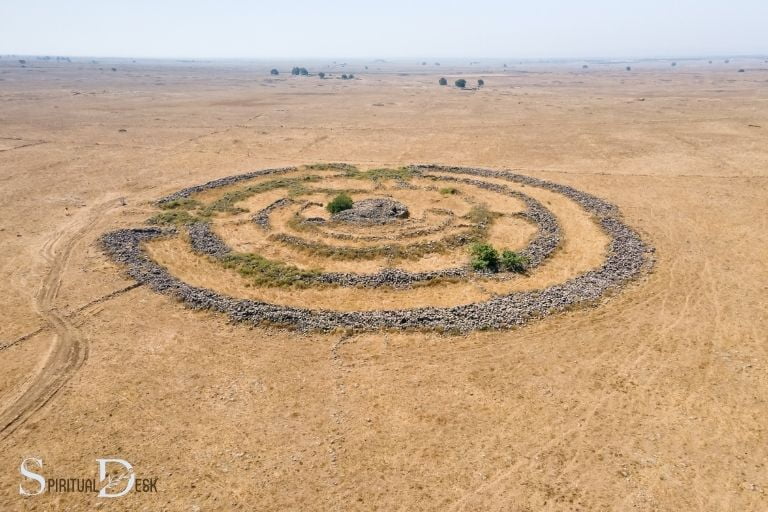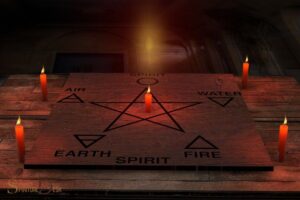What is the Spiritual Meaning of Gilgal? Renewal!
The spiritual meaning of Gilgal is a symbol of transformation, renewal, and the Israelites’ entrance into the Promised Land.
Gilgal, a Hebrew word meaning “circle of stones” or “wheel,” was a sacred location in the Old Testament that held deep spiritual significance for the Israelites.
The spiritual meaning of Gilgal is a symbol of transformation, renewal, and a significant milestone in the journey of the Israelites.
Here, they renewed their covenant with God, solidified their commitment, and commemorated God’s faithfulness, making it an essential location in the biblical narrative.
6 Aspects: Spiritual Meaning of Gilgal
| Spiritual Meaning | Description |
|---|---|
| Circle of Stones | Gilgal means “circle of standing stones” in Hebrew, which could represent a gathering place or a symbol of unity and strength among the people. |
| New Beginning | The Israelites crossed the Jordan River and entered the Promised Land at Gilgal, symbolizing a fresh start and a new beginning for the nation. |
| Obedience | The Israelites were circumcised at Gilgal, indicating their obedience to God’s command and their commitment to the covenant with Him. |
| Remembrance | Gilgal served as a memorial to remind the Israelites of God’s help and faithfulness during their journey to the Promised Land. It was a place where they could remember their past and renew their commitment to God. |
| Transformation | The Israelites’ time at Gilgal marked a transition from their life in the wilderness to settling in the Promised Land. This transformation can symbolize personal growth and spiritual development. |
| Divine Presence | Gilgal was also a place where the Israelites experienced the presence of God, as He guided and protected them during their journey. This can represent the idea of seeking and experiencing God’s presence in one’s own life. |
Key Takeaway

Five Facts About: The Spiritual Meaning of Gilgal
Understanding The Significance Of Gilgal In The Bible
Gilgal, a significant place mentioned in the bible, holds a spiritual meaning that is worth exploring.
It is a destination that goes beyond its physical location, resonating with deeper symbolism and significance in spiritual journeys.
Let’s delve into the historical and biblical context of gilgal, as well as understand its spiritual significance.
Gilgal’s Historical And Biblical Context:
- Gilgal was first mentioned in the old testament, specifically in the book of joshua. It served as the first campsite of the israelites after crossing the jordan river into the promised land.
- The name gilgal means “rolling away,” symbolizing the rolling away of the disgrace of the israelites’ captivity and the beginning of a new chapter in their history.
- It was at gilgal that the israelites commemorated the miraculous crossing of the jordan river by setting up twelve stones as a memorial.
- Gilgal also played a pivotal role in the spiritual history of the israelites. It served as a significant religious site, where they circumcised all the males who had not undergone the ritual during their time in the wilderness.
- This act of circumcision marked the renewal of their covenant with god and symbolized a fresh commitment to obey and follow him in the land of promise.
Exploring The Significance Of Gilgal In Spiritual Journeys:
- Gilgal represents a place of transition and change, where the past is left behind, and a new beginning awaits. It signifies a spiritual shift, a bridge between the old and the new.
- Just as the israelites chose to follow god’s command and take a step of faith in circumcising themselves, gilgal reminds us of the importance of obediently embracing god’s instructions in our spiritual journeys.
- Gilgal serves as a reminder to let go of the burdens, shame, and bondage of our past and embrace the freedom and newness of life that comes through our relationship with god.
- At gilgal, the israelites experienced a fresh encounter with god’s faithfulness and provision. Likewise, in our own lives, gilgal represents a place where we can expect god’s presence and provision as we step out in faith and obedience.
- It is not just a physical location but a state of heart and mind, inviting us to embrace transformation and a renewed commitment to god’s will for our lives.
Gilgal holds deep spiritual significance in the bible. Its historical context highlights the israelites’ transition into the promised land, while its spiritual significance represents a place of spiritual transformation, renewal, and obedience.
As we reflect on the lessons learned from gilgal, may we find encouragement to let go of the past, embrace new beginnings, and faithfully follow the path set before us in our own spiritual journeys.
The Symbolism Of Gilgal In Spiritual Transformation
Gilgal As A Site Of Renewal And Rebirth
Gilgal, a significant location in the bible, holds a deep spiritual meaning that goes beyond its historical context.
It symbolizes transformation and renewal, making it an essential concept for those seeking personal growth and spiritual enlightenment.
Let’s delve into the symbolism of gilgal in spiritual transformation.
Gilgal As A Site Of Renewal And Rebirth
- Gilgal, located near jericho, was a place of profound importance in the religious history of ancient israel. It was at gilgal that the israelites set up their first camp after crossing the jordan river, marking the end of their forty years of wandering in the wilderness.
- The name gilgal, derived from the hebrew word “galal,” means “rolling.” This rolling has a symbolic implication of letting go of old ways, shedding unnecessary baggage, and embracing a fresh start.
- Just as the israelites left their former life behind them as they entered gilgal, individuals today can use gilgal as a metaphorical representation of leaving behind their old self, their past mistakes, and negative patterns of behavior.
- At gilgal, the israelites symbolically circumcised themselves, signifying a cutting away of the old and embracing a new covenant with god. This act represents the initiation of a transformative journey towards spiritual growth and renewal.
- The act of circumcising oneself represented a commitment to obedience, purity, and surrender to god’s guidance, reflecting the necessary steps for personal transformation in our own lives.
- Like the israelites, we can use gilgal as a symbolic place to leave our past behind, renew our commitment to our spiritual journey, and embrace a fresh start with greater devotion and obedience to our higher purpose.
- Gilgal reminds us that transformation is an ongoing process. Just as the israelites moved forward from gilgal and faced new challenges in the promised land, we too must continue our journey, facing obstacles with resilience and unwavering faith.
Connecting Gilgal To Personal Transformation And Growth
- Gilgal serves as a powerful metaphor for personal transformation. By reflecting on its symbolism, we can draw important lessons for our own spiritual growth.
- Embracing gilgal’s meaning enables us to recognize that true transformation requires us to let go of our old ways and shed behaviors and patterns that no longer serve us.
- The act of stepping into gilgal represents a conscious decision to embark on a personal journey towards self-improvement, self-discovery, and spiritual awakening.
- Gilgal reminds us to be open to change and to embrace discomfort as a necessary part of growth. Just as the israelites faced challenges in their journey, we may also be confronted with obstacles as we strive to become the best version of ourselves.
- By connecting with the symbolism of gilgal, we can find solace in the knowledge that through our commitment to personal transformation and growth, we are empowered to overcome adversity and realize our fullest potential.
Incorporating the profound symbolism of gilgal into our lives can provide guidance and inspiration as we navigate our individual paths of spiritual transformation and growth.
By embracing gilgal’s symbolism of renewal and rebirth, we can let go of the past, embrace change, and embark on a journey towards greater self-awareness, wisdom, and fulfillment.
The Lessons We Can Learn From Gilgal
Gilgal As A Reminder Of God’s Faithfulness
Gilgal holds a significant spiritual meaning, serving as a reminder of god’s faithfulness throughout the accounts mentioned in the bible.
Here are the lessons we can learn from gilgal:
- The promised land: Gilgal marks the entry point into the promised land for the israelites after their 40 years of wandering in the wilderness. It symbolizes the fulfillment of god’s promise to bring them into a land flowing with milk and honey.
- Circumcision renews covenant: At gilgal, all the males born during the journey were circumcised as a sign of renewal for the covenant with god. This act represented a fresh commitment to follow god and his commandments.
- Stones of remembrance: After crossing the jordan river, the israelites set up twelve stones at gilgal to commemorate god’s miraculous parting of the river’s waters. These stones functioned as a reminder of god’s faithfulness in delivering them and the importance of passing on their experiences to future generations.
- Transition and transformation: Gilgal represents a place of transition, where the israelites left behind their nomadic lifestyle and embraced a settled existence. It signifies a mindset shift and the beginning of a new chapter in their spiritual journey.
- Letting go of the past: Gilgal also serves as a reminder to let go of the burdens and mistakes of the past. As the israelites entered the promised land, they had to leave behind the bondage of egypt and the failures of the wilderness. Gilgal teaches us the importance of forgiveness, repentance, and the freedom that comes with starting anew.
Finding Strength And Inspiration In The Stories Of Gilgal
The stories and lessons from gilgal provide us with encouragement and inspiration for our own spiritual journeys.
Here are some ways we can draw strength from gilgal:
- Remembering god’s faithfulness: Just as the israelites commemorated god’s faithfulness with stones, we should reflect on our own experiences of god’s faithfulness. By recalling his past provision, protection, and guidance, we can find strength and confidence to face present challenges.
- Embracing new beginnings: Gilgal reminds us that every transition in life is an opportunity for growth and a fresh start. We should embrace new chapters, leaving behind the past and stepping into the future with faith and courage.
- Renewing our commitment: Like the israelites’ circumcision at gilgal, we can make a personal commitment to renew our covenant with god. This includes surrendering our hearts, following his commandments, and seeking his guidance in all aspects of our lives.
- Building memorials: Just as the israelites set up stones as reminders, we can create our own memorials of god’s faithfulness. This could include maintaining a gratitude journal, displaying meaningful objects, or documenting answered prayers. These reminders solidify our faith and give us strength during challenging times.
- Letting go and forgiving: Gilgal teaches us the importance of letting go of past mistakes and forgiving ourselves and others. By releasing burdens and embracing forgiveness, we free ourselves to experience the fullness of god’s love and grace.
Gilgal serves as a powerful spiritual symbol, reminding us of god’s faithfulness, the importance of transitions, and the strength we can find in new beginnings.
Let us draw inspiration from gilgal’s stories and apply these lessons to our own lives, embracing god’s promises and journeying forward with renewed faith.
Applying The Spiritual Meaning Of Gilgal Today
Gilgal, a significant place mentioned in the bible, holds deep spiritual meaning and teachings that can be applied to our lives today.
Incorporating the principles of gilgal in our spiritual practices can guide our decision-making and life choices, bringing us closer to our inner selves and a higher spiritual understanding.
Let’s explore how the spiritual meaning of gilgal can impact our lives in the present day.
Incorporating The Principles Of Gilgal In Our Spiritual Practices
- Renewal of the covenant: In gilgal, the israelites renewed their covenant with god. Similarly, we can incorporate this principle in our spiritual practices by regularly renewing our commitment to align with our spiritual beliefs and values.
- Letting go of the past: As gilgal symbolizes leaving the wilderness and stepping into a new season, we can apply this principle by letting go of past hurts, resentment, and negativity. By embracing forgiveness and moving forward, we can create a space for personal growth and spiritual transformation.
- Embracing change: Gilgal represents a transition and embracing change. In our spiritual practices, we can learn to embrace change by being open to new ideas, experiences, and perspectives. This allows for personal growth and expansion of our spiritual awareness.
- Seeking divine guidance: Just as the israelites sought direction from god at gilgal, we can also seek divine guidance in our spiritual practices. Through prayer, meditation, and introspection, we can create space for communication with the divine and gain clarity in our spiritual journey.
How Gilgal Can Guide Our Decision-Making And Life Choices
- Centering on spiritual values: By reflecting on the principles of gilgal, we can make decisions and life choices that align with our spiritual values. This helps us live a more authentic life, staying true to our beliefs and principles.
- Discerning the path: Gilgal teaches us to discern the right path through seeking divine guidance. By connecting with our spiritual intuition, we can make decisions that are in alignment with our higher purpose and bring us closer to our spiritual goals.
- Embracing growth opportunities: Just as gilgal represented stepping into the promised land, we can view life choices and decisions as opportunities for growth and advancement. By embracing challenges and facing them with a spiritual mindset, we can evolve on our spiritual journey.
- Trusting the process: Gilgal teaches us the importance of trusting the process. When faced with difficult decisions or uncertain situations, we can trust in divine timing and have faith that everything happens for a reason. This allows us to surrender control and find peace in knowing that we are being guided.
Incorporating the spiritual meaning of gilgal in our lives today can bring depth, meaning, and guidance to our spiritual practices.
By centering ourselves on spiritual values, embracing change, and seeking divine guidance, we can make decisions and life choices that align with our higher purpose.
Trusting the process and embracing growth opportunities also allow us to evolve on our spiritual journey. Let gilgal serve as a reminder of the transformative power of spirituality in our lives.
Finding Our Own Gilgal Moments
Recognizing And Creating Our Personal Gilgal Moments
We all experience defining moments in our lives, where we are faced with the need for change, growth, and spiritual transformation.
In biblical terms, these moments are referred to as gilgal moments. Gilgal, meaning “rolling away,” signifies the shedding of old patterns, habits, and burdens, allowing us to move forward into a new season of spiritual renewal.
Recognizing and creating our personal gilgal moments empowers us to embrace opportunities for growth and transformation.
Here are some key points to consider:
Reflecting on past experiences: Take a moment to reflect on your past experiences and identify any instances where you felt a significant shift or turning point in your spiritual journey.
These moments could range from overcoming personal challenges to experiencing profound insights during times of meditation or prayer.
Letting go of the past: Just as the israelites left behind their old life in egypt when they crossed the jordan river into the promised land, we too must let go of old baggage and burdens to make room for spiritual renewal.
This involves releasing resentments, forgiving ourselves and others, and embracing a mindset of growth and possibility.
Stepping into the unknown: Gilgal moments often require us to step outside of our comfort zones and embrace the unknown. It may involve exploring new spiritual practices, engaging in self-reflection, or challenging our beliefs and assumptions.
By venturing into uncharted territories, we open ourselves up to new perspectives and opportunities for spiritual growth.
Embracing change: Change is an essential aspect of spiritual transformation. Embracing change means being open to new possibilities, even if they initially seem unfamiliar or challenging. It requires us to surrender control and trust in the divine plan for our lives.
Cultivating self-awareness: Developing a deeper understanding of ourselves is crucial in creating our personal gilgal moments.
This involves cultivating self-awareness through practices like mindfulness, journaling, and introspection.
By becoming more attuned to our emotions, thoughts, and patterns, we can identify areas in need of growth and initiate transformative change.
Seeking guidance and support: Gilgal moments are often facilitated by seeking guidance and support from mentors, spiritual leaders, or support groups.
These individuals can offer insights, encouragement, and accountability as we navigate our personal journeys of transformation.
Living with intention: To create our personal gilgal moments, we must live with intention. This means setting clear intentions and aligning our thoughts, words, and actions with our spiritual goals.
It involves making conscious choices that support our growth and allow us to embody our true selves.
Recognizing and creating our personal gilgal moments is an ongoing process that requires self-reflection, courage, and a willingness to embrace change.
By actively seeking these moments of spiritual renewal and transformation, we can embark on a journey towards a more meaningful, purposeful, and fulfilling life.
FAQ About the Spiritual Meaning Of Gilgal
What Is The Spiritual Meaning Of Gilgal?
The spiritual meaning of gilgal refers to its significance as a sacred place for spiritual renewal and transformation.
Why Is Gilgal Important In Biblical Context?
Gilgal holds importance in biblical context as it was the first campsite of the israelites after crossing the jordan river, symbolizing a new beginning.
How Does Gilgal Relate To Spiritual Growth?
Gilgal is associated with spiritual growth as it represents leaving behind the past and embracing personal transformation and spiritual development.
What Lessons Can We Learn From Gilgal?
Gilgal teaches us valuable lessons such as the importance of letting go of our past mistakes and embracing change for personal and spiritual growth.
How Can One Incorporate The Spiritual Meaning Of Gilgal In Their Life?
Incorporating the spiritual meaning of gilgal in life involves embracing new beginnings, releasing negative patterns, and seeking personal and spiritual renewal.
Conclusion
The spiritual meaning of gilgal is a testament to the transformative power within all of us. It teaches us that in order to truly move forward in our spiritual journey, we must let go of our past baggage and embrace change.
Just as the israelites left behind their old ways and embraced a new beginning at gilgal, we too can find renewal by shedding old habits, beliefs, and patterns that no longer serve us.
Gilgal reminds us that the journey towards spiritual growth is not always easy, but it is necessary for our personal evolution.
It symbolizes the opportunity to start anew, to leave behind our comfort zones and step into the unknown with faith and courage.
So, let gilgal be a reminder to us all that through surrender and self-transformation, we can uncover the true depth of our spirits and align ourselves with a higher purpose.
Bonus: The Spiritual Meaning of Gilgal
Where Is Modern-Day Gilgal?
It is difficult to say exactly where modern-day Gilgal is. The ancient city was located in the Jordan Valley, east of the River Jordan and north of Jericho.
However, there is no definitive site for the city and its exact location is unknown.
There are a number of possible locations that have been suggested by archaeologists, but none of them has been conclusively identified as Gilgal.
It is likely that the city was destroyed at some point in history and its remains have not been found.
What Is The Meaning Of The 12 Stones In The Bible?
The 12 stones in the Bible are a symbol of the 12 tribes of Israel. They were first mentioned in the Book of Exodus when Moses was instructed by God to build a tabernacle as a place for God to dwell among his people.
The tabernacle was to be built with 12 acacia wood boards, each representing one of the tribes of Israel.
These boards were to be inscribed with the names of the tribes and then covered with gold.
At each corner of the tabernacle, there was to be a silver socket, into which would be placed a pillar made from acacia wood and also covered with gold.
On top of these pillars were to be placed two stone tablets, each inscribed with the Ten Commandments.
In total, there were 12 stones used in the construction of the tabernacle – one for each tribe of Israel.
The second mention of the 12 stones comes in Joshua 4, when Joshua is instructed by God to take 12 men from among the tribes of Israel and have them each carry a stone from where they had crossed the Jordan River back to where they were camped.
These stones were then to be set up at Gilgal as a memorial to all that God had done for his people in bringing them into the Promised Land. So what do these 12 stones represent?
| Firstly, they are a physical representation of God’s promise to Abraham that his descendants would number as many as the stars in heaven or grains of sand on the seashore (Genesis 22:17). | Secondly, they remind us that even though we may sometimes feel like we are alone or isolated, we are actually part of something much larger – namely, God’s chosen people. | And thirdly, these stones stand as a reminder to us that our salvation does not come from our own efforts or works but from God alone. As it says in Ephesians 2:8-9 “For it is by grace you have been saved through faith not by works”. |
What Feast Did the Israelites Celebrate in Gilgal?
The Israelites celebrated the Feast of Weeks in Gilgal. This feast, also known as Pentecost, was observed 50 days after the Passover.
It commemorated the giving of the Law at Mount Sinai and was a time of thanksgiving for the first fruits of the harvest.
What are the 12 Stones of Israel?
The 12 Stones of Israel are a set of sacred stones that were brought back from the River Jordan by the Israelites after their Exodus from Egypt.
The stones were placed in a pile at the entrance to the Tabernacle, where they served as a reminder of God’s miraculous provision for His people. Each stone represented one of the tribes of Israel, and they were later used as part of the foundations for Solomon’s Temple.
Today, these same 12 Stones can be found in Jerusalem’s Western Wall, where they continue to inspire awe and remind us of God’s faithfulness.
Lessons From Gilgal Experience
The Gilgal Experience was a two-week educational program held in Israel for Canadian Jewish high school students.
The program was designed to educate participants about the history and culture of Israel and to promote understanding and tolerance between Jews and Arabs.
The Gilgal Experience began in 2006, and over the years has brought together hundreds of students from across Canada.
The program is run by the Centre for Jewish and Israeli Affairs (CIJA), a non-profit organization that works to build bridges between the Jewish and Arab communities in Canada.
During the Gilgal Experience, participants have the opportunity to learn about various aspects of Israeli life and culture, including its history, religion, politics, economy, and society.
They also visit historic sites such as Jerusalem�s Old City and Masada, and meet with Israelis from different backgrounds:
- Jews, Arabs, Druze, Bedouins, Christians, Muslims, etc.
- To learn about their experiences living in Israel.
The goal of the Gilgal Experience is to provide participants with a better understanding of Israel and to help them develop relationships with Israelis that can last a lifetime.
For many participants, the experience is life-changing � providing them with new perspectives on Judaism, Zionism, and the coexistence between Jews and Arabs.
Gilgal Meaning In Hindi
If you’re looking for the meaning of Gilgal in Hindi, you’ve come to the right place. Gilgal is a Hebrew word that can be translated to mean “circle” or “wheel.”
It’s often used in reference to the stone circles that were built by the Israelites in the desert as a way to remember their time spent wandering.
The word can also be used more broadly to refer to any sort of memorial or monument.
Gilgal Sermon
The Gilgal Sermon is a significant moment in the life of the Hebrew people. It is when Moses delivers a speech to them after they have crossed the Jordan River and are about to enter into the Promised Land.
This event is recorded in the Book of Joshua, and it is considered to be one of the most important speeches given in the Bible.
Moses begins his sermon by recounting all that God has done for His people. He reminds them how He led them out of slavery in Egypt and brought them through the wilderness to this point.
Moses then goes on to give them specific instructions for how they are to live once they enter Canaan.
These include obeying God’s laws, being faithful to Him, and living righteously. The Gilgal Sermon is an important reminder for Christians today of all that God has done for us.
It also serves as a warning against forgetting His commandments and turning away from Him.
We must always remember His faithfulness and obey His Word if we want to enjoy His blessings in our lives.
What is Gilgal Experience
What is Gilgal’s Experience? Gilgal Experience is an annual event that takes place in Israel. It is a time when people from all over the world come together to learn about and experience Jewish culture and heritage.
During Gilgal Experience, participants have the opportunity to take part in various workshops and activities.
They can learn about traditional Jewish customs and beliefs, as well as try their hand at some of the more modern aspects of Israeli life.
There is also plenty of time for sightseeing and exploring all that Israel has to offer.
Whether you are Jewish or not, Gilgal Experience is a great way to learn more about this fascinating culture. If you have ever wanted to visit Israel, this is definitely the trip for you!
Gilgal Meaning Malayalam
When it comes to baby names, there are endless possibilities. But what if you want something unique? Something that represents your culture and heritage?
If you’re looking for a name with meaning, look no further than Gilgal. Gilgal is a Hebrew name that means “circle of life.”
It’s a beautiful name for a baby boy or girl, and it’s sure to be memorable. If you’re looking for a name that celebrates your culture, Gilgal is a perfect choice.
12 Stones At Gilgal Today
When Joshua and the Israelites arrived at Gilgal after crossing the Jordan River, they camped there and erected twelve stones as a memorial of their deliverance.
The name “Gilgal” means “rolling away.” It was probably given this name because the stones were rolled into place (Joshua 4:20).
Today, there is no trace of the original twelve stones or of any other Israelite campsite at Gilgal. However, some believe that they may have been buried under subsequent layers of dirt and debris over the centuries.
Although we don’t know for sure where the original twelve stones were located, we do know that Gilgal was an important site for the early Israelites.
It was here that they first set foot in the Promised Land and began their conquest of Canaan. And it was here that God performed some amazing miracles on behalf of His people.
So whether or not you think you can find the actual stones today, a visit to Gilgal is definitely worth your time!
Gilgal Stones
Gilgal Stones are a type of standing stone that can be found in many parts of the world. They are often made of granite or other hard materials, and they range in size from a few feet to over 20 feet tall.
Gilgal Stones have been used for centuries as ceremonial sites and markers for important events.
In some cultures, they are believed to have magical properties. There are many different theories about the origins of Gilgal Stones.
Some people believe that they were created by ancient civilizations such as the Celts or Druids.
Others believe that they are natural formations that have been shaped by wind and water over time. Regardless of their origin, Gilgal Stones have become an important part of many cultures and traditions.
In recent years, there has been an increase in the number of people who are interested in visiting Gilgal Stones around the world.
If you�re planning on visiting one of these sites, it�s important to do your research ahead of time and be respectful of the culture and tradition associated with them.
Bethel And Gilgal
The history of the two ancient cities of Bethel and Gilgal is fascinating. Located in the Jordan Valley, these cities were once part of the Northern Kingdom of Israel.
Today, they are both ruins, but still hold great significance for archaeologists and historians.
Bethel was originally a Canaanite city called Luz. It was later conquered by the Israelites under Joshua and became an important religious site for them.
The name Bethel means �house of God� in Hebrew, and it was here that Jacob had his famous dream in which he saw a staircase leading to heaven (Genesis 28:10-22).
The city continued to be important in later centuries as well, serving as a royal residence for King Jeroboam I (1 Kings 12:29-31) and being mentioned frequently in the prophecies of Amos (Amos 3:14; 4:4; 5:5; 7:2,13; 8:2; 9:4).
Gilgal is best known as the place where Joshua circumcised all the Israelite men after they had crossed into Canaan (Joshua 5:2-9). This act symbolized their covenant with God and their new status as His chosen people.
Gilgal also served as an encampment for Israel during its early years in Canaan (Joshua 4:19), and it was here that Saul was crowned king (1 Samuel 11:15).
In later years, however, Gilgal fell into disfavor with God because of the sinful behavior of its residents (Hosea 4:15; 9:15; Amos 4:4).






